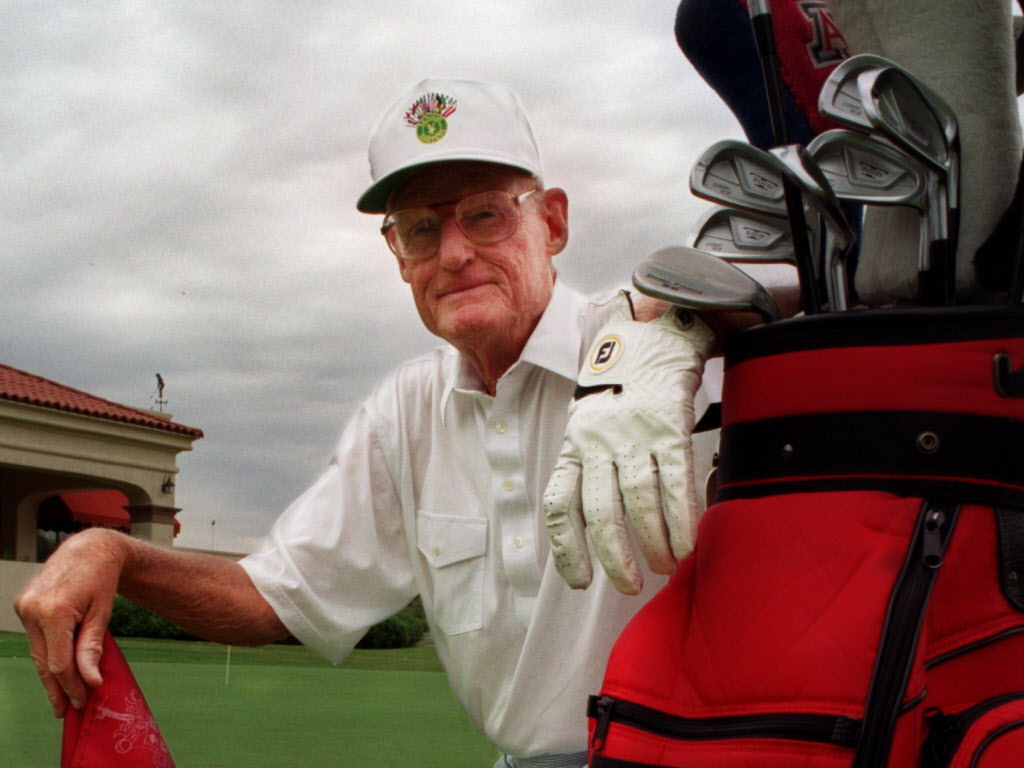April 5, 1962: Ed Updegraff competes in his first Masters
In 1932, at Iowa’s Boone Golf and Country Club, 8-year-old Ed Updegraff first caddied for his grandfather, Clarence Edgar Updegraff.
Even though grandpa Updegraff was a banker, it didn’t pay well: 10 cents for nine holes. But for Ed, it became a priceless education.
Thirty years later, on April 5, 1962, Dr. Ed Updegraff, a Tucson urologist, stood at the No. 1 tee at Augusta National and played in the first of six Masters championships.
“I hope I don’t shoot 95 and embarrass all the people who have wished me luck,” Updegraff told the Star that week. Instead, he shot 74, the same score as golfing immortal Gene Sarazen.
Over the years, Updegraff became the most accomplished amateur golfer in Arizona history.
He was born in Iowa, but has lived 65 of his 94 years in Tucson. In the golf community, everyone knows “Doctor Ed.”
He won 12 Tucson City Amateurs, four Arizona Amateurs and 27 Tucson Country Club yearly championships. The back tees at the TCC are appropriately called “the Updegraff tees.”
If you find anyone more respected and well-liked than Edgar Rice Updegraff, a graduate of the University of Colorado medical school, call me. It’ll be a scoop.
In 1999, the USGA honored Updegraff by selecting him as the recipient of the Bob Jones Award, the USGA’s highest honor. It has been awarded to Nancy Lopez, Jack Nicklaus, Ben Hogan, you name it.
For Updegraff’s 90th birthday, TCC members held a party at which Nicklaus sent a video telling of his memories of Updegraff. Arnold Palmer sent a poignant, handwritten letter. The emcee was Lanny Wadkins.
Most who meet Updegraff ask about 1969, the year he finished fourth in the Tucson Open (won by Lee Trevino), or about his 1981 championship in the U.S. Senior Amateur, or about those wonderful stories he tells about the days he played with Sam Snead and a list of golf’s most memorable players.
But Updegraff doesn’t often bite.
He’s got a wonderful sense of humor, marked by self-deprecating stories about the times he wasn’t the best golfer on the course.
I’ve twice had the pleasure to play golf with Dr. Ed. I was beyond nervous; I was almost frozen with fear, knowing that ultimately the man who was captain of the 1975 U.S. Walker Cup team — a squad that included Craig Stadler and Curtis Strange — would realize he was stuck for hours with a Golfer Who Couldn’t Hit It Straight.
Instead, he was welcoming and entertaining.
This is a man who has played competitively at St. Andrews, Turnberry, Pebble Beach, Augusta and Oakmont, but whose character-filled stories also include tales about his days at the local munis, like El Rio and Fred Enke.
The question Updegraff gets more than most is this: Why didn’t you turn pro?
“I couldn’t hit it long enough,” he told me. “I was always a strong iron player, but I just didn’t have the length off the tee.”
His first “major” amateur victory was the 1957 Western Amateur. Why don’t you turn pro, he was asked.
“I don’t regret not having turned pro. In fact, it doesn’t enter my mind. This way, I have more fun out of it.”
His urology practice limited the amount of time Updegraff could work on his game. A typical week was to play on Wednesday and Saturday, then hit a shag-bag of balls on the way home from work another afternoon.
I asked Updegraff about his finest moment in the six Masters he played.
Instead, he talked about his worst. It was 1963, and he was the No. 5-ranked amateur in the U.S. He was paired with Snead. At No. 15, a par 5 over Rae’s Creek, Updegraff was within range of making the cut, 75 yards from the pin.
He bladed his short wedge shot over the creek. He finished with a 9.
“I was so nervous,” he said. “I missed the cut. That was probably the most unfortunate moment of my career.”
One of very few.
Where are they now? Updegraff has been shooting his age since he was 67. He now plays frequently at Rolling Hills, an executive course on Tucson’s east side.
How he did it: “My first year in the Masters, 1962, I stayed at the course, at the cabins on the first hole,” he said. “They charged me $1 a day for lodging and $1 a day for meals. I never left the course.
“My expenses for the week were $14. I haven’t been back to Augusta since I last played there, in 1970.”





